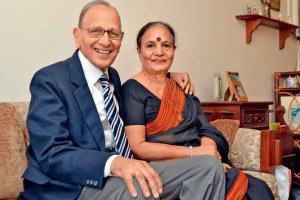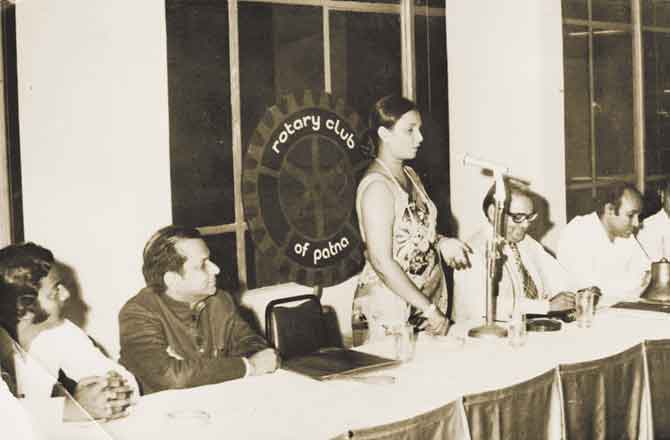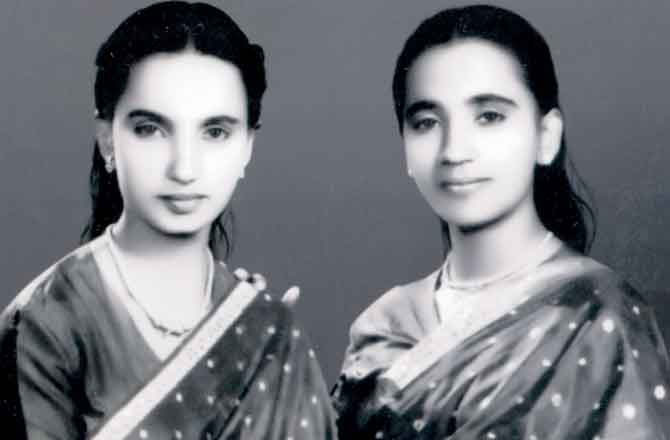Renowned paediatrician Dr RK Anand's wife celebrates her role in building an extended family that includes meat lovers and vegetarians

Dr R K Anand, 84, and Asha, 78, at their Worli residence. Pic/Datta Kumbhar
 If filmmaker Sooraj Barjatya ends up making another film in the Hum Apke Hain Kaun series, the heroine will be an unlikely one — a fish-loving Syrian Christian Keralite nurse married into a Hindu Punjabi family (where women were expected to stay vegetarian) of a leading paediatrician practicing in Mumbai, hailing from Amritsar. The rest of the template will be untouched — Karva Chauth fasting, anniversary bashes, gala dinners prepared by loving daughters-in-law and, not to forget, house helps who are treasured as blood relations.
If filmmaker Sooraj Barjatya ends up making another film in the Hum Apke Hain Kaun series, the heroine will be an unlikely one — a fish-loving Syrian Christian Keralite nurse married into a Hindu Punjabi family (where women were expected to stay vegetarian) of a leading paediatrician practicing in Mumbai, hailing from Amritsar. The rest of the template will be untouched — Karva Chauth fasting, anniversary bashes, gala dinners prepared by loving daughters-in-law and, not to forget, house helps who are treasured as blood relations.
In his prologue to the recently-released book 1959: A Love Story (Published by BecomeShakespeare.com) a tribute to joint and extended families by author Asha Anand, Barjatya has stopped short of declaring the deadline for the film, but exclaimed loudly: "Aunty, your book can be made into such a fine film! We have such a lovely character of the heroine that is You! ...If any family fits into the families shown in Hum Aapke Hain Koun and Hum Saath-Saath Hain, it will be yours Aunty!" The filmmaker says that reading the book "makes you want to go home, plan a family dinner and laugh together."

The author at a breastfeeding awareness workshop in Penang
Asha Anand is Barjatya's aunt in a loose sense of the term. He is part of her extended family of friends, as his children have been treated by her paediatrician-husband Dr R K Anand who is most known for The Penguin India Guide to Child Care. This year, the Anands complete 50 years at their Charni Road clinic where both spend their afternoons tending to children — covering new-borns to 18-year-olds and common coughs to paediatric obesity. While the husband takes to the stethoscope and prescribes the drugs, the wife explains the dosage and follows up case histories.
The book 1959: A Love Story charts the couple's partnership that flourishes in places as varied as Delhi, Pondicherry, Patiala, London and Philadelphia. It starts at Patna Medical College Hospital where a 17-year old Malayalee nurse falls in love with a Punjabi doctor whose father she was deputed to take care of. She leaves Kerala and nursing behind, as they get married despite opposition from both families which thought poorly of each other. Initial years as a wife and a mother of a toddler are bumpy, especially the stay with the in-laws in Patna when Dr Anand left for higher studies in the UK. Eventually, as the family grows (three sons) and moves to Mumbai, relations soften; though her mom-in-law has reservations about the meat in the refrigerator.

Asha Anand delivering an address at Patna Rotary club in 1977
Mumbai forms the key backdrop of the love story. Whether it is his tenure at Jaslok Hospital's Department of Paediatrics and Neonatology or his association with B Y L Nair Charitable Hospital, the couple functions in unison. This columnist has been privy to their team dynamic in professional and personal realms — as medicos-on-call reassuring a new mother managing infant diarrhea at home; as inspiring speakers on Indian parenting; as fierce consumer activists who took on the government for allowing advertisements of fancy health drinks for children.
Anands' contributions to international seminars on breastfeeding awareness is commendable; so is their experience of meeting with families who adopted Indian children as part of Moral Rearmament's work in Holland, Belgium and Sweden. Both are part of the Public Concern for Governance Trust and Initiatives of Change network to bridge cultural divides. In a lighter vein she says: "Both of us have Mumbai's crusader 'Rajani' streak!" They are feisty fighters for pedestrian walking avenues and vehicular traffic discipline; the lady more famous for taking errant cabbies to police stations. Her daily walk to the Worli sea face is a time for stocktaking of neighbourhood woes.

Asha, formerly Annie Chacko, with her sister Mary in 1961
For a reader who is not a votary of large family set ups, or who is sceptical of Bollywood's rose-tinted take on the undivided agrarian family, the Anands first seem to offer a too-good-to-be-true location for Rajshri Productions. But the memoir makes a strong case for richer community relations, apart from strong family bonding. There are places where the book sings eulogies to the great Indian joint family. But it is their multi-cultural backdrop and their ability to address religious faith-based biases, which paves the way for a layered narrative than what a Bollywood mainstream stereotype accommodates.
The couple's belief in harmony and mutual respect is seen in their relationships with dissimilar people, be it their neighbours (Scarlatos) in Philadelphia, the Nepal-born cook Ramsingh, their adopted son Rex Nazareth and their house help Shanmugham Shankar Thevar whose wedding invite had mentioned: Under the Presidentship of Dr R K Anand! Shankar's English skills were poor, but good enough to convey the ambit of his family.
The book is also a reminder of the infinite human potential for cultural adaptation. Annie Thaipparambil Chacko's transformation into Asha Anand is no easy makeover. Annie's life in a scenic Thazathangady (village near Kottayam, which Dr Anand cannot pronounce till date) is so unlike her later years in the metros, that the reader experiences the joy of meeting two different protagonists. Born and raised on the banks of Meenachil, Annie's childhood thrills were shelling of prawns and playing with elephants.
The chapter on Kerala — hand pulled rickshaws, nutmeg gardens, sunbathing turtles and boat rides with 25 paise ticket — encapsulates India's 'south' which stands in sharp contrast to the vibe of its 'north' where the Anands are situated. Asha Anand, in her crossover, bridges the famous north-south divide; speaking Punjabi as fluently as native Malayalam, cooking Hariyali Paneer alongside chicken stew (the book ends with her recipes)! Bound by neither religion, nor language, nor any other social or economic consideration, she creates a pan-Indian family that is currently in the 60th year! She says in jest: "Couples like ours paved the way for the Deepika Padukone-Ranveer Singh union!" That pre-dates hashtag #deepveer!
Sumedha Raikar-Mhatre is a culture columnist in search of the sub-text. She can be reached at sumedha.raikar@gmail.com
Catch up on all the latest Crime, National, International and Hatke news here. Also download the new mid-day Android and iOS apps to get latest updates
 Subscribe today by clicking the link and stay updated with the latest news!" Click here!
Subscribe today by clicking the link and stay updated with the latest news!" Click here!









